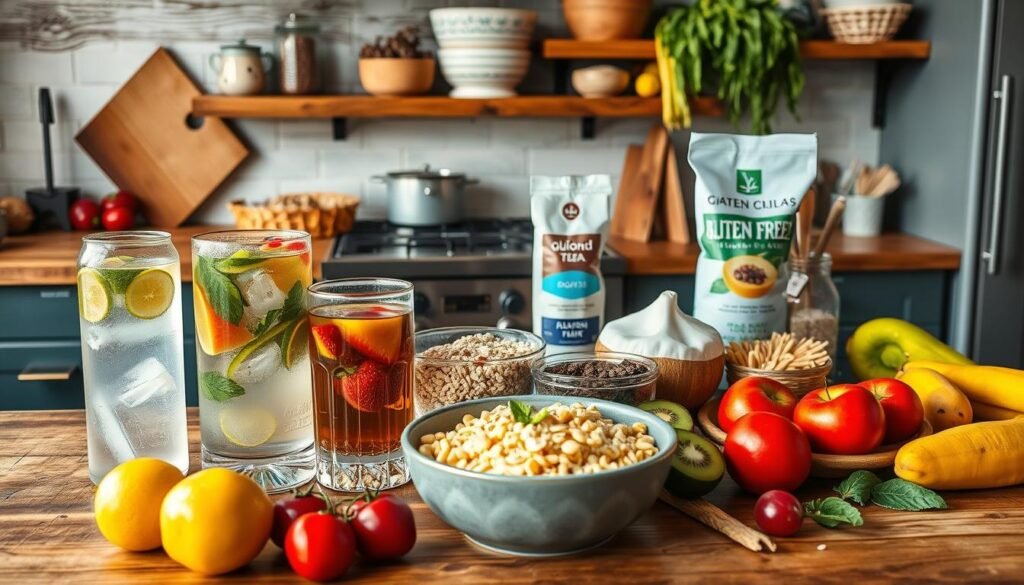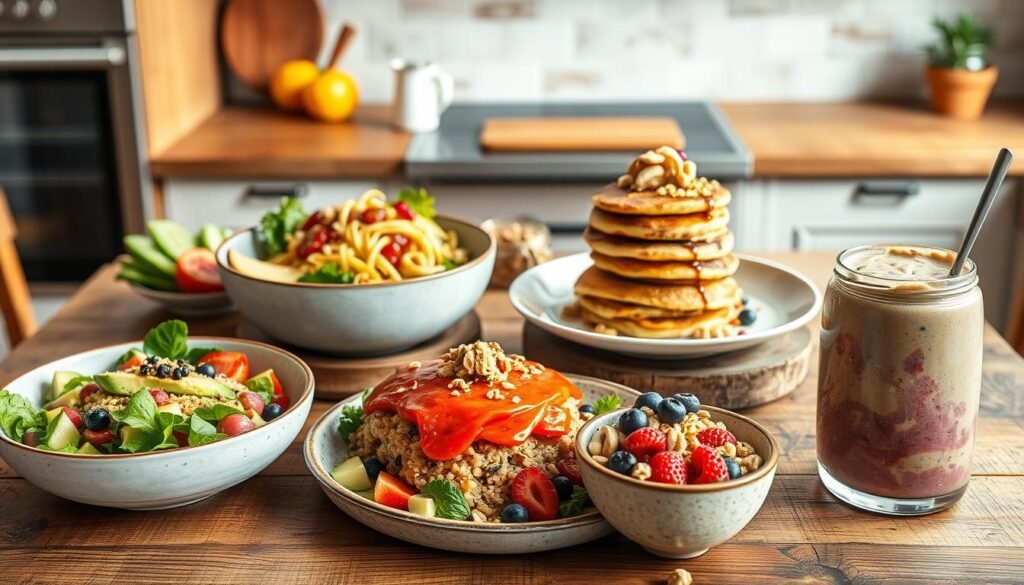
8 Easy Healthy Bowels
A staggering 70 million people in the United States suffer from digestive issues, with many turning to gluten-free alternatives as a solution. The link between gluten and digestive health has become increasingly important, with many seeking gluten-free substitutes to promote regular bowel movements. By exploring gluten-free options, individuals can take the first step towards better digestive wellness, and gluten-free alternatives are now more accessible than ever.
Key Takeaways
- Gluten-free alternatives can help promote regular bowel movements
- Gluten-free substitutes are now widely available for those with gluten intolerance
- Exploring gluten-free options can lead to better digestive wellness
- Regular bowel movements are crucial for overall health and wellbeing
- Gluten-free alternatives can be a solution for those with digestive issues
- Gluten-free options can help reduce symptoms of gluten intolerance
- Gluten-free alternatives can be incorporated into daily meals for better digestive health
Understanding the Link Between Gluten and Digestive Health
Gluten, a protein found in wheat, barley, and rye, can have a significant impact on digestive health. For individuals with gluten intolerance or sensitivity, consuming gluten can lead to a range of symptoms, from mild discomfort to severe digestive issues. Adopting gluten-free recipes and gluten-free menu ideas can help alleviate these symptoms and promote overall digestive well-being.
Some common signs of gluten sensitivity include bloating, abdominal pain, and changes in bowel movements. In severe cases, gluten intolerance can lead to conditions such as celiac disease, which requires a strict gluten-free diet to manage. By understanding the link between gluten and digestive health, individuals can make informed decisions about their diet and lifestyle, and explore gluten-free recipes and gluten-free menu ideas that cater to their needs.
For those looking to adopt a gluten-free diet, there are many resources available, including cookbooks, online recipes, and support groups. By exploring these resources and incorporating gluten-free menu ideas into their daily routine, individuals can take the first step towards improving their digestive health and overall well-being.
The Importance of Regular Bowel Movements
Regular bowel movements are essential for maintaining overall health and well-being. A healthy bowel routine can improve digestion, increase energy, and enhance immune function. To promote regular bowel movements, it is crucial to incorporate gluten-free cooking tips into your diet. This can include consuming foods high in fiber, such as fruits, vegetables, and whole grains.
Some tips for promoting regular bowel movements include:
- Drinking plenty of water to help prevent constipation
- Eating a balanced diet that includes a variety of whole foods
- Exercising regularly to stimulate bowel function
- Managing stress through techniques like meditation or deep breathing
By following these gluten-free cooking tips and making a few simple lifestyle changes, you can help promote regular bowel movements and improve your overall health.
| Food | Fiber Content |
|---|---|
| Apple | 4.5 grams |
| Carrot | 3.7 grams |
| Brown Rice | 3.5 grams |
Essential Gluten-Free Alternatives for Better Digestion
For individuals with gluten intolerance or sensitivity, finding the right gluten-free diet alternatives is crucial for maintaining digestive health. The best gluten-free alternatives can provide essential nutrients and fiber, promoting regular bowel movements and overall well-being.
Ancient Grains as Digestive Aids
Ancient grains such as quinoa, amaranth, and millet are excellent gluten-free diet alternatives, rich in fiber, protein, and minerals. These grains can help regulate digestion and provide a feeling of fullness and satisfaction.
Fiber-Rich Substitutes
Fiber-rich substitutes like brown rice, gluten-free oats, and almond flour can help increase fiber intake, promoting healthy digestion and bowel movements. These alternatives can be used in a variety of dishes, from breakfast cereals to baked goods.
Probiotic-Rich Options
Probiotic-rich options like yogurt, kefir, and fermented vegetables can help maintain a healthy gut microbiome, supporting immune function and digestion. These gluten-free diet alternatives can be incorporated into a daily diet, providing essential probiotics and nutrients.
By exploring these gluten-free diet alternatives and incorporating them into a daily diet, individuals can promote digestive wellness and overall health. The best gluten-free alternatives can provide essential nutrients, fiber, and probiotics, supporting a healthy gut and immune system.
Hydration’s Role in Bowel Health
Staying hydrated is essential for maintaining healthy bowel movements. Drinking enough water helps prevent constipation by softening stool and making it easier to pass. Additionally, hydration helps prevent digestive disorders by flushing out toxins and waste products from the body. When it comes to healthy gluten-free swaps, incorporating hydrating foods into your diet can be beneficial.
Some examples of hydrating foods that can support digestive health include watermelon, cucumbers, and celery. These foods are not only rich in water content but also contain essential nutrients and fiber that can help regulate bowel movements. By making healthy gluten-free swaps and incorporating these foods into your diet, you can help promote bowel health and prevent digestive disorders.

Here are some tips to help you stay hydrated and promote bowel health:
- Drink at least 8-10 glasses of water per day
- Incorporate hydrating foods into your diet, such as watermelon and cucumbers
- Avoid sugary drinks and caffeine that can dehydrate the body
By following these tips and making healthy gluten-free swaps, you can help promote bowel health and prevent digestive disorders. Remember to always consult with a healthcare professional before making any significant changes to your diet or lifestyle.
| Foods | Water Content | Gluten-Free |
|---|---|---|
| Watermelon | 92% | Yes |
| Cucumbers | 96% | Yes |
| Celery | 95% | Yes |
Natural Fiber Sources for Regular Movement
Increasing fiber intake is essential for promoting regular bowel movements and supporting digestive health. Individuals can achieve this by incorporating fiber-rich foods, such as fruits, vegetables, and whole grains, into their diet. Gluten-free alternatives can also provide a rich source of fiber, making them an excellent option for those with gluten intolerance or sensitivity.
A well-balanced diet that includes a variety of fiber-rich foods can help regulate bowel movements and prevent digestive disorders. Some examples of high-fiber foods include:
- Leafy greens, such as broccoli and spinach
- Fresh fruits, like apples and bananas
- Gluten-free whole grains, such as brown rice and quinoa
By making a few simple changes to their diet, individuals can increase their fiber intake and promote regular bowel movements. This can be achieved by replacing refined grains with gluten-free alternatives and incorporating more fruits and vegetables into their meals.
Remember, a healthy digestive system is essential for overall well-being. By making informed food choices and incorporating natural fiber sources into their diet, individuals can support their digestive health and promote regular bowel movements.
Incorporating Fermented Foods into Your Diet
Fermented foods are a great way to support digestive health, especially when combined with gluten-free substitutes. They contain probiotics, which help maintain a healthy gut microbiome. By incorporating fermented foods into your diet, you can improve digestion and boost your immune system.
Some examples of fermented foods include sauerkraut, kimchi, and kefir. These foods are rich in nutrients and can be easily incorporated into your meals. For instance, you can add sauerkraut to your salads or use kefir as a base for smoothies. When shopping for fermented foods, look for gluten-free options to ensure they align with your dietary needs.
Benefits of Fermented Foods
- Improved digestion
- Boosted immune system
- Increased nutrient absorption
Easy Fermented Food Recipes
Making fermented foods at home is easier than you think. You can start by making your own sauerkraut using cabbage, salt, and water. Simply shred the cabbage, mix it with salt and water, and let it ferment for a few days. You can also make kefir at home using a kefir starter kit and some milk. These gluten-free substitutes can be a great addition to your diet.
By incorporating fermented foods into your diet, you can support your overall health and well-being. Remember to choose gluten-free options and experiment with different recipes to find what works best for you.
Exercise and Physical Activity for Digestive Health
Regular exercise is essential for maintaining good digestive health. Physical activity can help improve digestion and bowel function, reducing the risk of digestive disorders. When combined with a healthy diet that includes gluten-free recipes, exercise can have a significant impact on overall digestive well-being.
Some benefits of exercise for digestive health include:
- Improved bowel function and regularity
- Enhanced digestion and nutrient absorption
- Reduced symptoms of digestive disorders, such as bloating and cramps
Incorporating physical activity into your daily routine can be simple. Try taking a short walk after meals, or engaging in activities like yoga or swimming. Even small amounts of exercise can have a positive impact on digestive health. By combining regular exercise with a balanced diet that includes gluten-free recipes, you can support your digestive system and promote overall well-being.
Remember to stay hydrated and listen to your body, especially when starting a new exercise routine. With consistent effort and a healthy lifestyle, you can improve your digestive health and reduce the risk of digestive disorders.
| Exercise Type | Benefits for Digestive Health |
|---|---|
| Walking | Improves bowel function and regularity |
| Yoga | Enhances digestion and nutrient absorption |
| Swimming | Reduces symptoms of digestive disorders |
Mindful Eating Practices for Better Digestion
Adopting mindful eating practices can significantly improve digestion and overall well-being. By paying attention to the way we eat, we can enhance the digestive process and reduce symptoms of digestive disorders. This approach involves being fully present while eating, savoring each bite, and listening to our body’s hunger and fullness cues.
When it comes to gluten-free menu ideas, mindful eating can help individuals make better choices. For instance, taking the time to properly chew food can aid in digestion, reducing the risk of discomfort and bloating. Additionally, being mindful of portion sizes and meal timing can help regulate bowel movements and prevent digestive issues.
Proper Chewing Techniques
Proper chewing is essential for breaking down food and absorbing nutrients. By chewing slowly and thoroughly, we can reduce the workload on our digestive system and minimize the risk of digestive problems. This technique is particularly important when exploring gluten-free cooking tips, as it can help individuals better tolerate gluten-free alternatives.

Meal Timing Strategies
Eating at regular intervals and listening to our body’s hunger and fullness cues can help regulate digestion. By adopting a mindful approach to meal timing, individuals can reduce symptoms of digestive disorders and improve overall digestive health. This approach can be particularly beneficial when combined with gluten-free menu ideas and gluten-free cooking tips, as it can help individuals better manage their digestive health.
Creating a Balanced Gluten-Free Meal Plan
A well-planned gluten-free diet can greatly support digestive health. When creating a balanced meal plan, it’s essential to consider gluten-free diet alternatives that are rich in nutrients. Some of the best gluten-free alternatives include brown rice, quinoa, and gluten-free oats.
Here are some tips for creating a balanced gluten-free meal plan:
- Start with a variety of gluten-free grains, such as brown rice, quinoa, and gluten-free oats.
- Incorporate a range of fruits and vegetables, including leafy greens, berries, and citrus fruits.
- Choose lean protein sources, such as chicken, fish, and tofu.
Breakfast Options
For breakfast, consider gluten-free options like gluten-free pancakes made with almond flour or gluten-free oatmeal with fresh fruit.
Lunch and Dinner Ideas
For lunch and dinner, try grilled chicken or fish with roasted vegetables and quinoa or brown rice. You can also experiment with gluten-free pasta made from rice or corn.
Healthy Snacks
Healthy snack options include fresh fruit, nuts, and gluten-free energy bars. Always read labels to ensure the ingredients meet your dietary needs.
By incorporating these gluten-free diet alternatives and best gluten-free alternatives into your meal plan, you can create a balanced and nutritious diet that supports digestive health.
| Gluten-Free Grains | Fruits and Vegetables | Protein Sources |
|---|---|---|
| Brown Rice | Leafy Greens | Chicken |
| Quinoa | Berries | Fish |
| Gluten-Free Oats | Citrus Fruits | Tofu |
Common Digestive Disruptors to Avoid
When it comes to maintaining healthy bowels, it’s essential to be aware of common digestive disruptors that can negatively impact bowel health. These disruptors can include certain foods and substances that can cause digestive issues, making it crucial to make informed choices about your diet and lifestyle. By incorporating gluten-free alternatives and gluten-free substitutes into your diet, you can reduce the risk of digestive problems.
Some common digestive disruptors to avoid include:
- Processed foods high in sugar and salt
- Foods high in saturated and trans fats
- Caffeine and carbonated drinks
- Spicy and fatty foods
By being mindful of these digestive disruptors and making conscious choices about the foods you eat, you can help maintain a healthy digestive system and reduce the risk of digestive problems. Incorporating gluten-free alternatives and gluten-free substitutes into your diet can also help alleviate digestive issues and promote overall health and well-being.
Remember, a healthy digestive system is essential for overall health and well-being. By making informed choices about your diet and lifestyle, you can help maintain a healthy digestive system and reduce the risk of digestive problems.
| Foods to Avoid | Gluten-Free Alternatives |
|---|---|
| Processed foods high in sugar and salt | Fresh fruits and vegetables |
| Foods high in saturated and trans fats | Lean proteins and healthy fats |
| Caffeine and carbonated drinks | Herbal teas and water |
Building Sustainable Digestive Health Habits
Establishing a daily routine that supports digestive health is crucial for overall well-being. By incorporating healthy gluten-free swaps into your diet, you can reduce the risk of digestive discomfort and promote a balanced gut. One way to achieve this is by starting your day with a nutritious breakfast, followed by regular meals and snacks throughout the day.
When it comes to gluten-free options, there are many alternatives to choose from. Some examples include:
- Brown rice
- Quinoa
- Almond flour
- Coconut flour
These options can be used to make a variety of dishes, from breakfast bowls to dinner entrees.
Daily Routine Recommendations
To support digestive health, it’s essential to stay hydrated by drinking plenty of water throughout the day. Aim to drink at least eight glasses of water per day, and consider increasing your intake if you’re physically active or live in a hot climate.
Weekly Meal Prep Strategies
Meal prep can be a great way to ensure you’re getting the nutrients you need to support digestive health. Consider setting aside one day per week to prepare healthy meals and snacks for the upcoming days. This can include cooking proteins, roasting vegetables, and preparing gluten-free options such as salads and stir-fries.
By following these tips and incorporating healthy gluten-free swaps into your diet, you can support digestive health and promote overall well-being.
| Food | Gluten-Free Alternative |
|---|---|
| Bread | Gluten-free bread made with almond flour or coconut flour |
| Pasta | Gluten-free pasta made with brown rice or quinoa |
| Cereals | Gluten-free cereals made with corn or rice |
Conclusion: Your Path to Better Digestive Health
As you’ve discovered throughout this comprehensive guide, achieving optimal digestive health involves more than just avoiding gluten. By incorporating gluten-free alternatives, gluten-free substitutes, and other gluten-free options into your diet, you can take proactive steps towards better bowel health and overall well-being.
Remember, the journey to improved digestive function is a holistic one. By prioritizing hydration, incorporating fiber-rich foods, and embracing fermented delicacies, you can create a nourishing foundation for your gut. Additionally, regular exercise and mindful eating practices can further support your body’s natural processes.
Ultimately, the path to better digestive health is in your hands. By making informed choices and adopting sustainable habits, you can embark on a transformative journey towards enhanced vitality and vitality. Embrace the power of a gluten-free lifestyle and unlock the boundless benefits for your overall well-being.


